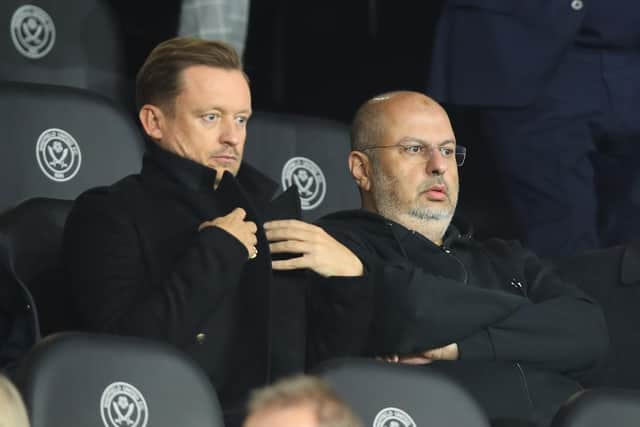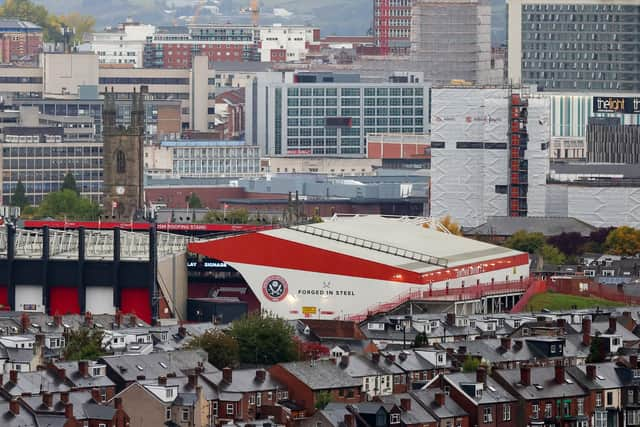Sheffield United: How, why and who - Explaining the takeover talk at Bramall Lane
and live on Freeview channel 276
Earlier this year, an attempt by a North American businessman to seize control collapsed following several months of talks between the two parties. The Star’s James Shield answers some of the key questions generated by suggestions Prince Abdullah’s reign in South Yorkshire could be drawing to a close.
Why could Sheffield United be sold? To put things simply, Prince Abdullah and his board of directors do not have access to the necessary funding required to make United competitive at Premier League level. Indeed, even if the worst case scenario unfolds and Paul Heckingbottom’s team fail to gain promotion, the signs are that they would struggle to make enough money available to overhaul the squad, address a situation whereby 16 of its members are scheduled to depart over the summer following the expiration of their contracts or loans and ensure standards remain as high as they are now.
Advertisement
Hide AdAdvertisement
Hide AdUnderstandably, United’s hierarchy have not spoken explicitly about this. But there are enough clues out there to suggest that cash is in pretty short supply right now. A new training pitch, originally supposed to be opened over the summer, still wasn’t operational last week. United’s women recently saw a match postponed because the undersoil heating at Bramall Lane wasn’t switched on. Perhaps most worrying of all, coaching staff clearly feel there is a possibility Iliman Ndiaye could be sold next month after excelling for Senegal at the World Cup. Predictably, the chatter around Sander Berge has also restarted although the Norwegian is thought to be happy to stay put until at least the end of the campaign.
Prince Abdullah has provided money from his own personal accounts. But for long periods of his reign, United have also been self-financing with the monies gained following their two seasons in the top-flight under Chris Wilder and march into last term’s play-off semi-finals under Heckingbottom being used to implement various projects. Often, some sources have claimed, to the detriment of his transfer budget.
What steps have to be completed before that happens? Unlike Prince Abdullah’s coronation as United’s owner, which occurred following a High Court battle with his predecessor and former director Kevin McCabe, any sale now would be a pure business transaction.
When talks reach an advanced stage, as they are thought to have now, would-be buyers are usually granted a period of exclusivity which means no discussions can take place with any rival bids - officially at least, although they sometimes are facilitated via a third part of back channel operation.
Advertisement
Hide AdAdvertisement
Hide AdWhen a price has been agreed, the would-be new owner then has to prove both their probity and proof of funding to the English Football League. Often asked for spending projections, this can be a complex and arduous process. Particularly given the money laundering checks introduced following the outbreak of war between Russia and Ukraine. One club which was recently sold took nearly two months to go through this process.


Why did Henry Mauriss’ takeover fail? Because he couldn’t provide the EFL with the necessary evidence to gain their approval. The American, who runs California based in-house broadcasting form Clear TV, experienced similar problems during an earlier flirtation with Newcastle. Earlier this month, United launched a court action to recoup what they claim is an unpaid £10m deposit pertaining to these discussions.
Mauriss is known to have been using a complicated bond structure, leveraged against Clear TV, to finance his proposed takeover. People with knowledge of the talks which took place have told this newspaper he changed the bank he was using to put the package together in an attempt to push it through but to no avail.
Could the same thing happen again? Potentially, yes. However, if United used one of the many well-established banking institutions who introduce clubs to prospective buyers then the chances of another hiccup should be slim. Lessons are also likely to have been learnt following the episode with Mauriss.
Advertisement
Hide AdAdvertisement
Hide AdAre there other interested parties? Again yes, although they have yet to make contact with United. Prince Abdullah met with a media organisation in Saudi Arabia about the possibility of making an investment in United during his partnership with McCabe. The Bin Laden family was also approached. Many North American businesspeople want to gain a foothold in European football while there is known to be interest from Asia too.


What would a new owner acquire? If United were still competing in the PL, or located in a supposedly more fashionable area of the country, then the likelihood is they would have been sold long ago. They enjoy a passionate fan base, possess a genuine chance of gaining promotion and also a rich heritage. Sheffield is the birthplace of the modern game and United’s home stadium is the oldest professional ground still in use in the world.
Crucially, and this makes them an attractive proposition, they own Bramall Lane and their training ground - although a new site must be identified and developed in order to gain category one academy status. United’s property portfolio, which Prince Abdullah was compelled to buy from McCabe following the High Court judgement, also includes a hotel. This has lain empty since McCabe’s departure, with United apparently either unwilling or unable to trigger the licensing agreement they are known to have entered into with a major operator.
Some clubs own very little other than players. At United, this isn’t the case.
Advertisement
Hide AdAdvertisement
Hide AdMauriss wasn’t interested in taking control of United World, the company which controls Prince Abdullah’s portfolio of sporting interests, and it is expected that any new owner would only buy United. But, intriguingly, many investors in English football are building multi-club models of their own.
